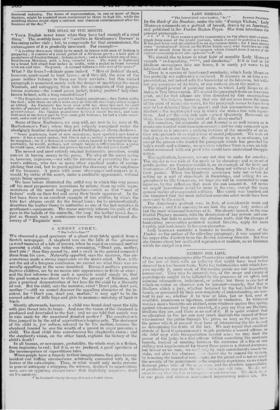LADY MORGAN.
" The fastest thief cries loudest, fie.'" SCOTCH PROVERB. IN the Book of the Boudoir, under the title "Foreign Visitors;' Lady
, a y
MORGAN comments on a portrait of herself, drawn by an American, and published in the Yankee Boston Paper. She thus introduces the peccant paragraph:— " * 5 5 * Here comes a pretty commentary on the above text—a para. graph from some of the ribald journals, which it would be pollution to name. It has just been sent me enclosed in an anonymous letter ; for I have always some goodnatured' friend (as Sir Peter Teazle says) who furnishes me with abuse of myself from those newspapers which !would deem it enact of ute highest immorality to let into my house."—P. 148.
We should like to know in what light of morality Lady MoanaN regards " evil-speaking, *****, and slandering." If it is bad to let libellous newspapers into our house, it is surely yet worse to let falsehood out of our lips. There is a species of hap-hazard mendacity, which Lady MORGAN has probably not sufficiently considered. It consists in making a re- presentation, not indeed with the knowledge of its falseness, but with- out any assurance of its truth, or any concern about the matter.
The ribald journal of polluting name, to which Lady MORGAN al- ludes, is THE SPECTATOR. Ire copied the paragraph from an American print, and for that offence are thus described by this unscrupulous person. We believe, however, I hat she did not even know the name of the print of which she wrote, for the paragraph seems to have been sent to her detached from the paper; and that circumstance the more illustrates the unprincipled way in which she makes free with reputa- tions. And yet lids very lady rails against Quarterly Reviewers for libel, thus exemplifying the point of tin above motto !
For ourselves, the character of our ,Tcurnal is so well known as b render one word of refutation unnecessary ; and we only comment upon the matter as it presents a striking instance of the morality of an su- thor who prat ends to so high a tone of moral judgment. We were tot called upon to avow ourselves ; the allusion to us is So obscure, :hat except the person who headed the paragraph which has provokei the lady's wrath and calumny, we question whether there is even an indi- vidual connected with our print who would have understood the appli- cation.
The application, however, we are not slow to make for ourselves. The slander is too wide of the mark to be alarmirrr ; and as an act of public justice we therefore exhibit it, as an example of the levity and wantonness of her Ladyship's censures, flung out without a th,,t.glit of their justice. When the Quarterly gentlemen take her to task for setting up a sort of slave-trade in friendships, and selling her ac- quaintance to Mr. CoonuaN, we hope she will be reconciled to some injustice, by the reflection that even she can commit it. Of malice we acquit her—there could be none in the case, except the vague general malice of exasperated self-lOve. Her vanity was touched, and she imagined that the most diabolical assassins must needs have been accessory to the smart.
The American's portrait was, in fact, of considerable truth and cleverness ; and it is amusing to see how the angry lady notices all but the most whimsical bearings of it. She diverts herself, in the true Fretful Plagiary manner, with the description of her person and con- versation, but fails to perceive the obvious truth, that the charges of toad-eating propensities preferred against Iavixo, apply far more forcibly, and notoriously to her own character.
Lady MORGAN commits a thunder M treating Mr. NEIL of the Yankee as the author of the offending paragraph; it was copied into his paper (the Yankee) from the Boston Literary Gazette. But thus she throws about her scoffs and reproaches at random, as an Irishman wields his cudgel in a row.


















 Previous page
Previous page